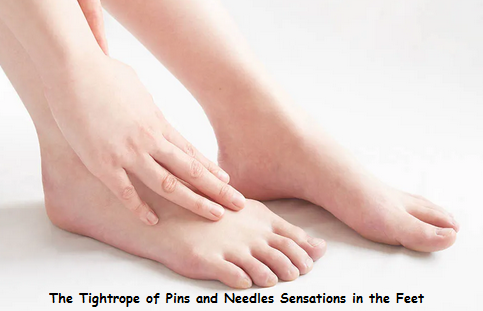Pins and needles, tingling sensations, or numbness in feet create an unusual dance with discomfort. The symphony of sensations is triggered by various factors; prolonged sitting, ill-fitting shoes, or nerve compression may lead to this sensory experience, akin to dancing on the edge of a nerve-induced precipice. Beyond the transient discomfort of crossed legs or tight footwear, persistent pins and needles signal underlying issues such as neuropathy, tarsal tunnel syndrome, or vascular problems. Understanding this condition unveils a narrative of nerve health and overall well-being, prompting a closer examination and medical intervention.
Pins and needles sensations in the feet, also known as paresthesia, can have various causes:
- Pressure on nerves from prolonged crossing legs, sitting, or standing in the same position compresses nerves and leads to temporary tingling or numbness.
- Peripheral neuropathy can lead to peripheral neuropathy, causing damage to the nerves in the feet and resulting in tingling or numbness. Conditions like alcohol abuse, certain medications, and nutritional deficiencies can also contribute to neuropathy.
- Wearing shoes that are too tight or narrow can compress nerves and impede blood flow, causing tingling sensations.
- Carpal tunnel syndrome involves compression of the posterior tibial nerve in the ankle, leading to tingling, burning, or numbness in the feet.
- Peripheral artery disease (PAD) leads to reduced blood flow to the legs and feet, often associated with atherosclerosis, and can cause tingling or pain.
- Morton’s neuroma where a nerve in the foot becomes compressed or irritated, leading to tingling, numbness, or pain, often between the third and fourth toes.
- Sciatica compression or irritation of the sciatic nerve, which runs from the lower back down the legs, can cause tingling sensations in the feet.
- Accidents or injuries to the feet can damage nerves and result in tingling sensations.
Preventing pins and needles in the feet involves adopting mindful practices and addressing underlying causes. First and foremost, maintaining good posture and avoiding prolonged periods of sitting or standing can reduce pressure on nerves. Wear properly fitting shoes that provide adequate support and avoid tight footwear to help alleviate unnecessary compression on nerves. Regular exercise, especially activities that promote good circulation, can contribute to overall foot health. Additionally, managing conditions like diabetes, which can contribute to neuropathy, through proper medical care and lifestyle choices is crucial. Taking breaks during extended periods of immobility and incorporating stretching exercises can also play a significant role in preventing the uncomfortable sensation of pins and needles in the feet.
If you are experiencing persistent or recurrent pins and needles in your heel, consult with a Houston foot doctor at DeNiel Foot & Ankle Center for a thorough examination, take your medical history, and perform necessary tests to determine the underlying cause and recommend appropriate treatment. Ignoring such symptoms may lead to complications, so seeking timely medical advice is crucial.

